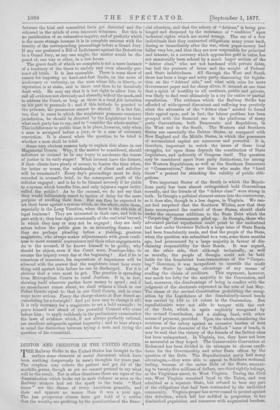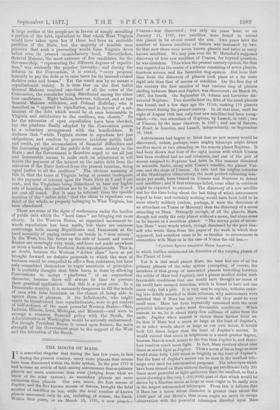DEBTOR AND CREDITOR IN THE UNITED STATES.
THE Railway Strike in the United States has brought to the surface some elements of social discontent which have been seething dangerously in men's thoughts for years past. The eruption may relieve the patient and get rid of the morbific germs, though as yet we cannot pretend to say what will be the result. But in other directions there are signs of the dissatisfaction which broke out in mob violence as soon as the Railway strikers had set the spark to the train. "Hard times" are the theme of every American grumble, and their end appears no nearer than it was a year ago. The less prosperous classes have got hold of a notion that the wealthy are profiting by the peculiarities of the finan- cial situation, and that the misery of "debtors," is being pro- longed and deepened by the insistence of " creditors " upon technical rights which are moral wrongs. The cry of a few individuals that they contracted obligations many years back, during or immediately after the war, when paper-money had fallen very low, and that they are now responsible for principal and interest, in a currency which approaches gold in value, has not unnaturally been echoed by a much larger section of the "debtor class," who are not burdened with private debts, but feel the pressure of taxes and the weight of Federal and State indebtedness. All through the West and South there has been a large and noisy party clamouring for legisla- tion on the "debtors' side," and what with cries for more Government paper and for cheap silver, it seemed at one time that a spirit of hostility to all creditors, public and private, was likely to find vent ultimately in a cry for entire or partial repudiation. The evidence which the Railway Strike has afforded of wide-spread discontent and suffering was precisely what the advocates of the "debtor class" needed to found their appeal upon, and in fact, the labour problem has been grouped with the financial one in the platforms of many party Conventions, both Democratic and Republican, in the West and in the South. The Western and Southern States are essentially the Debtor States, as compared with New England and the Middle States, in which the possessors of accumulated capital are numerous and powerful. It is, therefore, important to watch the issues of these local struggles, for upon them depends the constitution of State Legislature, and indirectly of Congress itself. The question may be considered apart from party distinctions, for among the Western Republicans, as well as the Southern Democrats or " Conservatives," there are those who make the "hard times" a pretext for attacking the validity of public obli- gations. Two important States of the South in which the Repub- lican party has been almost extinguished held Conventions recently, and the friends of the "debtor class" were strong in both. In Georgia a political element enters into the controversy, as it does also, though in a less degree, in Virginia. We can- not feel surprised that the Southern Whites, now that they have reconquered the control of those States, should chafe under the enormous additions to the State Debt which the "Carpet-bag" Governments piled up. In Georgia, those who advocated partial repudiation could point to the undoubted fact that under Governor Bullock a large issue of State Bonds had been fraudulently made, and that the people of the State, when the question was submitted to a vote, some three months ago, had pronounced by a large majority in favour of dis- claiming responsibility for their Bonds. It was argued, on the other side, that although technically, as well as morally, the people of Georgia could not be held liable for the fraudulent loan-transactions of the " Carpet- bag " Governor, it was inexpedient to unsettle the credit of the State by taking advantage of any means of evading the claims of creditors. This argument., however, was much too lofty for the majority in the Convention, and had, moreover, the disadvantage of being in conflict with the judgment of the electorate expressed in the vote of last May. The clause of the revised Constitution prohibiting the recog- nition by the Legislature of the fraudulently-issued bonds was carried by 166 to 16 voices in the Convention. But repudiationists were not able to tamper with the rest of the Debt, which is again explicitly recognised by the revised Constitution, and a sinking fund, with other means of payment, provided. Upon the whole, considering the noisiness of the outcry against an excessive burden of debt and the peculiar character of the " Bullock" issue of bonds, it may be said that the victory of the friends of the Debtor class has been unimportant. In Virginia, too, they have not been as successful as they hoped. The Conservative Convention at Richmond has been divided in its attempts to choose candi- dates for the Governorship and other State offices by the question of the Debt. The Repudiationist party had many advantages,—they were able to appeal to Southern sectional feeling, because of the entire Debt of the State, amount- ing to twenty-five millions of dollars, one-third rightly belongs, as the Virginians assert, to West Virginia. During the Civil war, West Virginia remained loyal to the Union, and was admitted as a separate State, but refused to bear any part of the obligations that had been contracted by the undivided community. Virginia proper has never ceased to protest against this defection, which left her saddled in proportion to her diminished population and resources with augmented burdens.
A large section of the people are in favour of simply annulling a portion of the debt., equivalent to that which West Virginia would have taken upon her if there had been an amicable partition of the State, but the majority of sensible men perceive that such a proceeding would force Virginia down below even its present unsatisfactory level. Nevertheless, General Mahone, the most extreme of five candidates for the Governorship, "representing the different degrees of repudia- tion," was evidently the popular favourite ; and during the debates in the Convention, it is stated, "every proposal honestly to pay the debt or to raise taxes for its interest evoked derisive cries and hisses." Yet the result was by no means a repudiationist victory. It is true that on the first ballot General Mahone received one-third of all the votes of the Convention, the remainder being distributed among the other four candidates. Eight ballots, however, followed, and at last General Mahone withdrew, and Colonel Holliday, who is described as "opposed to repudiation, and in favour of a set- tlement of the debt which would be at once honourable to Virginia and satisfactory to the creditors, was chosen." So far the advocates of open repudiation have been checked, but the platform finally adopted by the Convention points to a voluntary arrangement with the bondholders. It declares that "while Virginia scorns to repudiate her just obligations, and resolves to preserve inviolate public faith and credit, yet the accumulation of financial difficulties and the increasing weight of the public debt cause anxiety to the State ; and the Government is therefore urged to use all just and honourable means to make such an adjustment as will insure the payment of the interest on the entire debt from the resources of the State derived from the present taxation, doing equal justice to all the creditors.' The obvious meaning of this is, that the taxes of Virginia being at present inadequate to the payment of interest upon the State Debt at 5 and 6 per cent., and the Virginians being disinclined to bear any higher rate of taxation, the creditors are to be asked to take 3 or 4 per cent all round. But it may be inferred from the specific mention of the "entire debt," that the claim to repudiate one- third of the whole, as properly belonging to West Virginia, has been abandoned.
These are some of the signs of restlessness under the burden of public debt which the "hard times" are bringing out more clearly. In the Western States, no organised movement to- wards repudiation has been made, but there are ominous mutterings both among Republicans and Democrats at the hard necessity of paying interest on bonds in "dear money." In the West, too, the forces on the side of honest and sound finance are seemingly very weak, and have not made anywhere as stout a battle as the Southern Anti-repudiationists. This is, no doubt, because the Western "debtor class" have as yet brought forward no definite proposals to which the men of business would be compelled to offer a firm resistance, but have only committed themselves to vague assertions of principles. It is probably thought that little harm is done by allowing Conventions to accept " platforms " of an unpractical character, because there will always be time to prevent their practical application. But this is a great error. In a Democratic country, it is eminently dangerous to fill the minds of men with false doctrines, on the chance of being able to uproot them at pleasure. If the Inflationists, who might easily be transformed into repudiationists, were to get control of half-a-dozen of the most powerful Western States—Ohio, Indiana, Illinois, Iowa' Michigan, and Missouri—and were to arrange a common financial policy with the South, the Administration at Washington would be seriouely embarrassed. For though President Hayes is sound upon finance, the main strength of his Government must be the support of the West
and the toleration of the South. •































 Previous page
Previous page